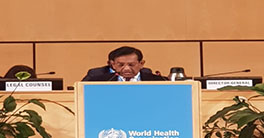

Plenary Session
Seventy Second World Health Assembly, Geneva;
20-28 May 2019
Address by Hon. Dr Rajitha Senaratne, Minister of Health, Nutrition and Indigenous Medicine, Sri Lanka
Director General, Excellences, ladies and gentlemen,
At the outset, on behalf of the government of Sri Lanka, let me appreciate the leadership of Dr. Tedros, Director-General WHO for moving forward untiringly the WHO mandate in shaping global health.
Excellences and distinguished delegates,
I am happy to report that Sri Lanka has made further progress in health care delivery since the last WHA. The National Policy on Health care delivery for UHC is now being implemented through the adoption of a Five year Action plan. At sub national level too, plans have been prepared, and are at an early stage of implementation with the support of our development partners, namely, the WB and ADB.
Sri Lanka has enjoyed Universal Health coverage for almost seven decades through a comprehensive, completely free at the point of delivery health care system incorporating promotive, preventive, curative, rehabilitation care, fully supported by the Government. Providing such a system is challenging but we are committed to move forward. The policy reform spells out a revitalization, reorganization and retooling process emphasizing primary health care strengthening. I am happy to report that the Essential Service Package thus developed was launched on World Health Day this year, with technical support from the WHO.
Excellences, Ladies and Gentlemen
Our interventions to address NCDs are noteworthy to mention. The prevention and early detection program for NCDs is being further strengthened through 846 Healthy life style centers and 906 Well Women Clinics established island-wide. We have introduced an 90% tobacco tax, plain packaging, restrictions on sale and marketing which are expected to further reduce smoking from present 13%. We have also introduced a Traffic light system of labelling for sugar and salt and transfat for confectionaries. A sugar tax for sweetened drinks is also imposed.
The ongoing primary care reform process will further support addressing chronic NCDs. My Ministry has made several important interventions to reduce out of pocket expenses of patients by making curative services more affordable to the public while making the essential drugs for NCDs more available through domestic production programs we have initiated including fixing of maximum retail prices for the 48 most commonly used drugs, 16 of which are important in addressing NCDs. Further 25 was added to this list since my address to this assembly last year. Quality intra-ocular lenses, cardiac stents, cochlear implants, prosthesis, cancer drugs, bone marrow and organ transplant are some of the services provided to patients seeking treatment at government hospitals free of charge. My Ministry has also upgraded the laboratory facilities in government hospitals, including the introduction of auto analyzers to handle the ever increasing analytical work load which will enable patients to get almost all the essential investigations done through the hospital reducing the financial burden on the patients.
To mitigate the ckdu problem, we have already installed 600 Dialysis machines in high risk areas soon to be increased to 900 by the year end and also supported by a domestic peritoneal dialysis programme. And a government supported renal transplant programme is working well
In order to maintain Malaria and Filariasis ‘Free’ status and to prevent their reintroduction via inbound migrants we hope to introduce an inbound health assessment scheme shortly. To address TB, HIV, Dengue, Malaria and Filariasis, soon we shall adopt, an inclusive approach to assess and treat long-term resident migrants - we do not want to leave any one behind!
However I have to admit that all is not rosy. Our reforms have critical challenges to overcome. Human Resources are a critical factor, and we would need not only mechanisms to increase the pool of suitably qualified personnel and their recruitment, but also to assess their performance periodically in the context of primary care reforms. Government initiatives to increase provisions for specialized training for medical personnel, setting up of three new medical faculties, a new faculty to train 2000 nurses and introduction of degree programmes for para-medical staffs are some of the initiatives to address the shortage.
Yet another important area that we are attempting to address is changing the mind set of people in seeking treatment from secondary or tertiary facilities rather than going to the closest primary care hospital, under a scheme which will adopt a family medical model with empaneled population and a built in referral system .
In conclusion I wish to take this opportunity to thank the DG for his drive towards primary care strengthening. In this respect I have no doubt that the Astana Declaration is indeed a timely instrument. I believe in this regard Sri Lanka has much to contribute along the lines mentioned on an 'operational framework for Primary health care '.
Finally, let me acknowledge the strong technical and partnership support we have received from the World Health Organization over the years, and convey a special word of thanks to you Dr Tedros, Dr. Poonam Singh the Regional Director for South Asia, and the Sri Lanka country office. We look forward to continuing this strong partnership in the years ahead.
Thank you.




